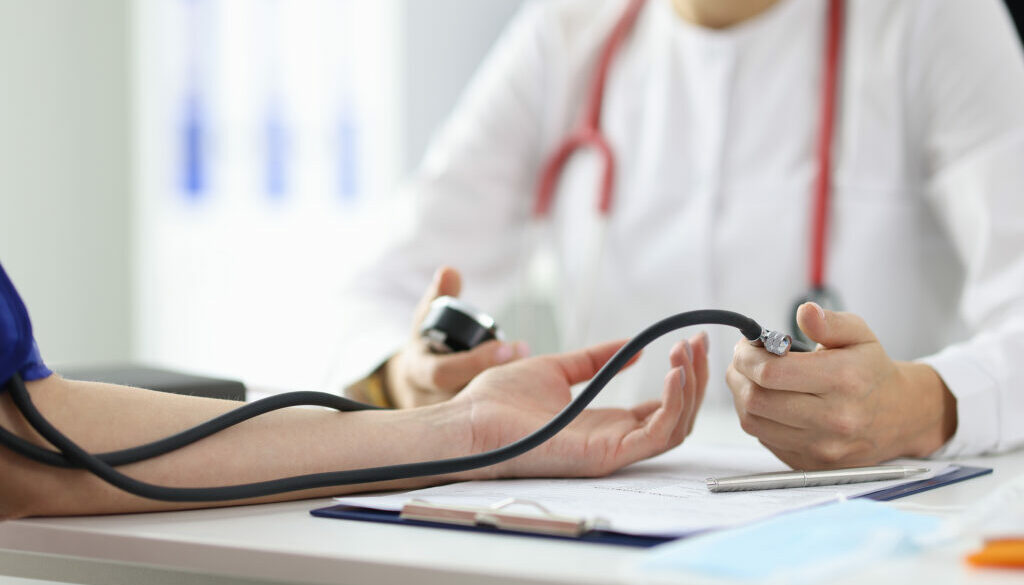Important Facts About High Blood Pressure
High blood pressure affects nearly half of all American adults…and many of them don’t even realize they have it. This is because there are often no signs of high blood pressure.
In addition, only about 1-in-4 adults with high blood pressure have the condition well-controlled, according to information from the Centers for Disease Control, and the disease costs the U.S. around $131 billion annually.
This is one of the main reasons that it is referred to as a “silent” disease—often are no obvious signs and the only way to determine if you have it is to have it checked regularly by one of our internal medicine doctors in Cary as part of an annual wellness exam.
In this article, we’ll provide useful facts and insights into high blood pressure as well as tips you can use to help lower it under the supervision of one of our experienced internal medicine physicians
What Do the Numbers On Your Blood Pressure Reading Mean?
Hypertension, can have a powerful impact on your health, putting you at greater risk of heart disease and strokes.
To fully understand how these numbers affect your heart, we have to take a brief journey through your circulatory system.
How Does Your Circulatory System Work?
Your circulatory system is an amazing, complicated, and efficient way your body delivers oxygen and nutrients to every part of your body. Following is a simplified version of how it works.
Your heart consists of four chambers: the left and right atrium (which are the upper chambers) and the left and right ventricles (the lower chambers). When the heart relaxes, blood flows from the atria to the ventricles. Then the ventricles pump, sending oxygen-rich blood to the arteries.
The arteries send blood throughout your body’s network of capillaries, where it releases nutrients. The blood then gathers carbon dioxide and returns to the heart through the veins where the process starts over again.
What Is Systolic Pressure and Diastolic Pressure?
When your doctor measures your blood pressure, the reading is measured in millimeters of mercury (mmHg) and is given as two numbers, for example—“110 over 80.” This represents two readings: the systolic (as in this case, the 110) and the diastolic (in this case, the 80).
When your heart beats, it sends blood throughout your body, and the pressure or force of the blood against your artery walls is considered systolic pressure. Diastolic pressure is the amount of force against your arteries in between your heartbeats.
What Is Considered High Blood Pressure Numbers?
You are considered “at risk” for prehypertension if your systolic number is in the 120 to 130 mmHg range and your diastolic is in the 80 to 89 mmHg range.
Hypertension or high blood pressure is defined as having a systolic number of 140 mm Hg or higher and a diastolic of 90 mm Hg or higher
Normal blood pressure means your systolic should be less than 120 mmHg and your diastolic less than 80 mmHg
While both numbers are very important, physicians examine the top number as a major risk factor and may give more attention to it depending on the individual situation. However, if either the upper or lower number is elevated, your internist can make a diagnosis of high blood pressure, according to the American Heart Association.
In most people, systolic blood pressure rises steadily with age due to the increasing stiffness of large arteries, long-term build-up of plaque, and an increased incidence of cardiac and vascular disease.
However, elevated systolic or diastolic blood pressure alone may be used to make a diagnosis. And, according to recent studies, the risk of death from ischemic heart disease and stroke doubles with every 20 mm Hg systolic or 10 mm Hg diastolic increase among people from age 40 to 89.
Is There an Effective High Blood Pressure Diet?
A nutritious diet is part of a healthy lifestyle, and we encourage our patients to schedule an appointment with our dietitian, Nicole Matala to help ensure they are on the right track. Even making small adjustments to your diet can help you maintain healthy levels.
What Are Some Other Ways to Lower High Blood Pressure Numbers?
In addition to diet, we recommend these lifestyle changes:
Stop smoking
Smoking is one of the worst habits for your health because it raises your blood pressure and places you at greater risk for stroke and heart disease. According to the Centers for Disease Control, around 16 million Americans are living with diseases that directly result from smoking.
Reduce caffeine
We’re not saying you have to completely give up your Starbucks, but just be aware that caffeine can raise blood pressure in those who don’t consume it that often. There are still studies being done to determine the total impact of caffeine on this disease, so we encourage you to speak with us for the latest information.
Control stress
We live in a hectic world. Between work, school, and a variety of activities, it’s very easy to let stress and anxiety take hold of your life—it’s not unusual for many people to feel overwhelmed and upset.
If you are constantly worried or if stress is making it difficult to complete everyday activities, we can make some recommendations to help you, which may include relaxation techniques and regular exercise. Speak to us for more information.
Need Help Maintaining a Healthy Blood Pressure? Visit Our Internal Medicine Doctors in Cary
For more than 25 years, we’ve helped Cary residents who are struggling to maintain healthy blood pressure, and we can offer safe and effective treatment that is tailored to help you.
This means we look at the overall picture of your health through regular wellness appointments and physicals, which can pinpoint chronic medical conditions before they put you at risk for more serious health issues.
Depending upon your case, we may use dietary and lifestyle changes in addition to medication to lower your blood pressure to safe levels.
Overdue for your physical? Unsure of your blood pressure numbers? Contact us for an appointment today.
When Is the Best Time to Take Blood Pressure Medication?
It’s very important that you speak to one of our general practitioners in Cary about what time you should take your medications.
Is it better to take your medicine in the morning or at night?
The answer to this question depends upon your doctor’s instructions. Previously, it was thought that blood pressure medication should always be taken at night. The logic behind this was that most heart attacks happen in the early morning, so the goal was to bring blood pressure down during the night, according to information from the Mayo Clinic.
However, more recent studies didn’t reinforce this point. Why? Because for most people, blood pressure tends to be lower at night, anyway. In addition, taking diuretics, a type of blood pressure medication, at night could be inconvenient because it causes you to go to the bathroom.
There are two important things to remember when taking your medicine:
- Take it at the same time each day.
- Take it at the time your doctor recommends, whether that’s in the morning or evening.
What Are the Most Popular Medications for High Blood Pressure?
There are several types of blood pressure medications, according to information from the American Heart Association. The most common include:
- Diuretics – These drugs help your body get rid of excess water and salt.
- Beta-blockers – These medications slow your heart rate.
- ACE inhibitors – These help your body produce less angiotensin. This chemical is partially responsible for narrowing arteries.
- Calcium channel blockers – These prevent calcium from entering the linings of the heart.
- Alpha-blockers – These relax the muscles in the heart’s vascular walls.
- Central agonists – These reduce tension in blood vessels.
- Peripheral adrenergic inhibitors – These block neurotransmitters.
- Vasodilators – These medications also allow the blood vessels to widen to enhance blood flow.
The “Silent Killer”
As mentioned earlier, high blood pressure is often called the silent killer because it often doesn’t present any symptoms. However, if you have any of the risk factors listed below, you should schedule an appointment with us to have it checked:
You have diabetes.
Roughly 60 percent of those with diabetes also have this disease.
You have previously had prehypertension.
This occurs when your readings are higher than normal but not high enough to be diagnosed as hypertension.
You are obese.
Obesity is a risk factor for developing this condition.
You drink too much alcohol.
According to the Centers for Disease Control, men should have no more than two drinks a day while women should limit themselves to one. If you drink more than this, you should speak with one of our physicians so we can evaluate how this contributes to your risk.
You have a family member with high blood pressure.
There is a genetic component to this disease, so please let us know if you have relatives who have been diagnosed with hypertension.
You are African-American
Those with African-American heritage tend to develop high blood pressure more often and earlier in life than those of other ethnicities.
You’re over 65
The risk of developing this disease increases with age
You eat too much salt
Salt can make your blood pressure worse. Talk to us about some flavorful salt alternatives.
You live a sedentary lifestyle
Exercise is good for you on so many levels, and being active is a good way to lower your blood pressure.
Not sure if you’re at risk? Take this quiz.
Five Complications of High Blood Pressure
While heart disease makes headlines as the number one killer in America, high blood pressure doesn’t seem to get as much press.
But three out of four people who have had their first stroke have had high blood pressure. And the disease is linked to several other complications.
Following are some complications that can occur if it is not properly treated:
1. STROKE
A stroke occurs when the brain is not able to get an adequate blood supply, most typically caused by a blood vessel blockage. Depriving the brain of oxygen can lead to long-term damage, such as paralysis, vision loss, and memory problems.
2. KIDNEY DAMAGE
The kidneys’ job is to filter toxins out of the blood. When the arteries in the kidneys are damaged, they are unable to clean the blood, and also have difficulty regulating levels of salt, hormones, and acids.
3. HEART DAMAGE
Even if you do not have a heart attack, high blood pressure can cause extensive damage to the heart and coronary arteries. Within the heart, this disease:
- Damages the arterial walls. Once damaged, they can accumulate fats, plaque, and cholesterol
- Speeds up the hardening of the arteries
- Can cause chest pain such as stable or unstable angina
- May contribute to an irregular heartbeat, such as atrial fibrillation
4. VISION LOSS
The strain placed on the blood vessels in the eyes can lead to permanent vision problems. In addition, the optic nerve may swell, making it difficult to see clearly. Your physician can evaluate your eyes by carefully examining the tiny capillaries on the retina.
5. ERECTILE DYSFUNCTION (ED)
ED may not be the first thing to come to mind when thinking about high blood pressure, but it can restrict the blood flow needed for an erection.
High blood pressure may not exhibit any symptoms, and that is one reason why it is important to have it regularly evaluated by one of our physicians in Cary.
Do You Have a Medical Home? See the Benefits of Working with an Internist in Cary
One of the advantages of working with an internal medicine physician in Cary is that we frequently help patients who are dealing with two or more chronic diseases. We not only treat those with high blood pressure, but we offer services for diabetes management, high cholesterol, and allergies.
Many of our patients can utilize our internists as general practitioners in Cary. Contact us today to schedule an appointment.
What Is Low Blood Pressure and Can It Be Too Low?
High blood pressure is often in the spotlight, with articles and physicians warning of its dangers, which can include heart failure and strokes.
But what about the opposite extreme? Is it possible for your blood pressure to be too low?
Your internal medicine physicians in Cary at Cary Medical Group want you to know that most of the time if you’re feeling fine, low blood pressure is no cause for alarm, although it should be monitored closely because it could be an indicator of an underlying medical condition.
However, there are a few occasions where low blood pressure calls for immediate medical attention.
We’ll explore low blood pressure, answer common questions and explain how our internal medicine physicians can help.
What Constitutes Low Blood Pressure?
A normal blood pressure reading is less than 120 (systolic) over 80 (diastolic).
Low blood pressure is also called hypotension, and it occurs when the top number is lower than 90 and the bottom number is 60 or lower.
What Causes Low Blood Pressure?
There are several different causes, and in some cases, low blood pressure may be caused by mild dehydration or spending too much time in the sun.
Other potential causes of low blood pressure include:
- Pregnancy
- A low heart rate
- Heart disease or issues with the heart valves
- Thyroid diseases
- Blood sugar issues, and even diabetes
- Losing a lot of blood, particularly from internal bleeding
- Septicemia, which occurs when an infection enters the bloodstream
- Anaphylaxis
- Poor nutrition or lack of nutrients
- Certain medications
What Does Low Blood Pressure Feel Like?
Sometimes, those with low blood pressure may become so lightheaded they may faint. This, along with dizziness, are a common symptom. They are most noticeable when you go from lying or sitting to standing—particularly if you stand quickly.
If you have low blood pressure, you may also:
- Feel nauseated
- Experience fatigue
- Have difficulty concentrating
- Experience fading or blurry vision
Can Your Blood Pressure Be Too Low?
Yes, it is possible, but most of the time, as long as you’re feeling fine and don’t have any bothersome symptoms, your internal medicine specialist will monitor your condition and keep a close eye on your blood pressure.
However, if your blood pressure is extremely low and you exhibit the following symptoms, you should contact your doctor as soon as possible:
- Skin that is cold, clammy, and pale
- Rapid and shallow breathing
- Confusion (this is more commonly seen in older people)
- Rapid and weak pulse
- Fainting or dizziness upon standing
Who Is at Risk for Developing Low Blood Pressure?
Anyone can develop low blood pressure, but those over the age of 65 may experience drops in blood pressure after they eat or when they stand from a sitting or lying position. Certain medications can cause low blood pressure, as can certain diseases such as Parkinson’s or diabetes.
Are There Different Types of Low Blood Pressure?
Yes, there are orthostatic hypotension, postprandial hypotension, and neurally mediated hypotension.
- Orthostatic –sometimes called postural—hypotension occurs when your blood pressure drops suddenly when you stand up after sitting or lying down.
- Postprandial hypotension occurs around two hours after eating, and it is more commonly seen in older adults.
- Neurally mediated hypotension is the result of a miscommunication between the brain and the heart that causes a drop in blood pressure after someone has been standing for a long period.
How Is Low Blood Pressure Treated?
We will work closely with you to tailor a plan to fit your individual needs. If your low blood pressure is mild and isn’t causing any problems, we’ll likely just monitor it at your regular checkups.
-
ADJUST YOUR SALT INTAKE
One caveat here: too much salt can cause high blood pressure, and it’s important that you maintain the proper balance. We recommend talking to our dietitian who will be happy to help you create a wonderful nutritional plan to fit your busy lifestyle.
-
DRINK MORE WATER
Dehydration can cause low blood pressure, so be sure to drink plenty of water throughout the day, and avoid sports drinks that may be loaded with “hidden” sugars.
-
USE COMPRESSION STOCKINGS
Check with your doctor first. These can reduce the chances of blood pooling in your legs, which can be one of the results of low blood pressure.
-
MEDICATIONS
In certain cases, medications may help, and if this is the case, we’ll find a suitable medication to fit your needs. Often, this is all that is needed to alleviate low blood pressure.
Your Cary Internal Medicine Doctors Near You: Always Ready to Help You Live a Healthier Life
There’s a reason we’ve been serving the community for decades. It’s our dedication to excellence coupled with compassion and the desire for you to have the healthiest life possible.
We’re happy to help you achieve your wellness goals, whether that means having a yearly physical, creating a nutrition and exercise plan, or managing chronic diseases like diabetes. We want you to have a healthier life, and we’re committed to helping you achieve your wellness goals.
Ready to get started? Contact us for an appointment, and see why the Cary community has trusted us for more than 25 years.




